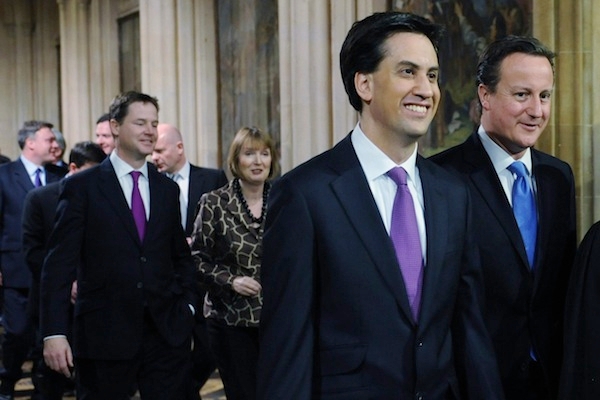Tory MPs were in buoyant mood as they dashed off to the 7 p.m. vote on Monday night. They shouted out hearty greetings to each other, slapped backs and had a spring in their step. They were buzzing in the way a fielding team does just after the fast bowler has hit a star batsman a painful blow on the body. The cause of this excitement: No. 10’s display of brute political force over the lobbying bill.
When news first broke of Patrick Mercer’s troubles, the Cameroons could barely conceal their schadenfreude. They were not going to mourn the political demise of Cameron’s most vituperative backbench critic. But the headlines were still about Tory sleaze. Labour began demanding to know why the government had abandoned plans for a statutory register of lobbyists. The government, to the alarm of Tory MPs, was being pushed on to the back foot again.
Then, late on Monday afternoon, came details of the proposed lobbying bill. To Westminster’s surprise, it included a clampdown on the trade unions. There were measures to control their spending in the year prior to an election and to investigate the accuracy of their membership lists. It was a brazen attempt to turn this crisis to the coalition parties’ political advantage.
The Labour leadership was indignant, complaining that these measures are normally taken forward on a cross-party basis. But the ploy had worked. Labour was now on the defensive, trying to explain away its opposition to change. This act of low politics so cheered the Tory troops because of how unexpected it was. David Cameron’s No. 10, to their frustration, is a surprisingly unpolitical place. Even loyalist Cabinet ministers privately vent about ‘the complete lack of political drive in Downing Street’. Few people there wake up every morning thinking about how they will do over the Labour party today. The Tory hope is that this bit of crude-but-effective ju-jitsu is a sign that Downing Street has realised it has to be more political.
Intriguingly, Nick Clegg is on board for this effort to curb the unions’ political influence. I understand that these measures were almost agreed for the Queen’s Speech but there was a feeling that more work was needed on the detail. This crisis has given the bill the impetus it needed. Despite No. 10’s fear that Clegg is becoming an increasingly unreliable legislative partner, they’re convinced that he’ll stay the course on this. Their confidence is rooted in the personal vilification that the unions have heaped upon him. For months, whenever Clegg returned to Sheffield and his constituency he was met by a Unison poster attacking him as ‘Cleggzilla’. ‘If you’re on the receiving end of that,’ says a senior No. 10 figure, ‘you’re all too aware of union power. That pain is very real.’
There’s political life in the coalition yet, then. But it doesn’t have the monopoly on election planning. Ed Balls and Ed Miliband’s interventions this week were part of a concerted effort to win back some credibility for Labour on its two weakest issues, economic competence and welfare. The Labour leadership are acutely aware that at the next election the Tories will present them as a bunch of spendthrifts. By sacrificing the winter fuel payment of wealthier pensioners to austerity, they mean to show that Labour understands that the years of plenty are behind us.
That move was also designed to cause Cameron a particular problem. During the election debates, he promised to protect pensioner benefits. He has kept to this commitment despite intense pressure from his coalition partners — and his Welfare Secretary, Iain Duncan Smith — to abandon it. The expectation in Whitehall is that the pledge will be quietly dropped at the next election. But Labour are much struck by polling which shows that the Tories have lost more votes to Ukip among the over-60s than any other group: Ukip has 23 per cent of the grey vote. They calculate that if Cameron were to match their policy, he would exacerbate this problem. And if he doesn’t, Labour can point to at least one area where their appetite for the hard choices of fiscal rectitude is greater than Cameron’s.
But buried beneath Balls’s announcement there was an even more significant shift. Labour is moving away from its Keynesian critique of the coalition’s deficit reduction plan; hence Balls’s strong hint that Labour will match the day-to-day spending plans for each department. Instead, it intends to differentiate itself with plans for a large programme of infrastructure spending. Miliband wants the choice at the next election to be one between the future and the past.
But the Tory leadership believes that Labour’s past remains its Achilles’ heel. They are delighted by Balls’s refusal to concede that Labour spent too much, because it helps them paint him as someone who would make exactly the same mistakes all over again.
Miliband’s challenge on welfare is to connect with a public that feels the benefits system is being exploited. In this downturn, in a break from the historical norm, public attitudes to welfare have hardened. Miliband, not a natural populist, has so far not had any truck with this new mood. He’s refused to use the phrase ‘benefit cheat’ and won’t back the government’s £26,000 a year benefits cap despite knowing how popular it is. His brains trust hope that by talking about a structural cap in welfare spending, he can neutralise the potency of the Tory charge that it isn’t fair that some families can claim more in benefits than the average family earns in a year. I doubt it.
The next election is shaping up to be a thoroughly traditional affair. The Tories will depict Labour as reckless spenders who are in the pockets of the unions. Labour, for their part, will paint the Tories as the party of the rich. But the prize will go to the party that can promote its own ideas as well as attacking its opponents’.







Comments